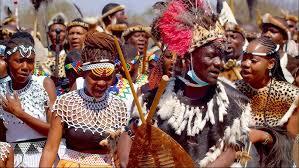Opinion / Columnist
Munhumutapa Day, a strategic counter to the growing Ndebele nationalism?
17 Sep 2024 at 08:10hrs |
0 Views

Zimbabwean President Emmerson Mnangagwa celebrated his 82nd birthday this weekend at the iconic Great Zimbabwe Monuments, an event rich in symbolism and political ambition. The choice of venue underscores Mnangagwa's apparent desire to invoke historical legacies and bolster his efforts to extend his rule beyond the 2028 constitutional limit.
Mnangagwa, born on September 15, 1942, according to official records, has been at the center of speculation regarding his attempts to secure a third term in office.
The President's choice to mark his birthday at Great Zimbabwe, a historical site associated with the ancient Mutapa Kingdoms, was no accident. The site, which reflects the grandeur of Zimbabwe's historical empires, was selected to emphasize Mnangagwa's ambitions and to invoke the aura of historical kingship. The event featured grand displays of national pride and was marked by the introduction of "Munhumutapa Day," a new annual national celebration aligning with Mnangagwa's birthday.
The celebration also included the launch of a new housing project in Masvingo, intended to be replicated nationwide. However, Mnangagwa's choice of Great Zimbabwe and the introduction of Munhumutapa Day seem designed to underscore his ambitions for a lasting legacy, drawing parallels with the historical rulers of the Mutapa state. This move also appears to be a strategic counter to the growing Ndebele nationalism symbolized by the rising prominence of Mzilikazi Day, which commemorates the 19th-century Ndebele king.
Mnangagwa's political maneuvering comes amid growing concerns over his attempts to extend his tenure, which has been compared to the historical examples of long-serving leaders in Africa. Critics argue that Mnangagwa's actions reflect a desire for imperial dominance akin to that of historical monarchs, contrasting sharply with democratic principles. His attempts to align himself with the legacy of the Mutapa kings, while shrouded in symbolism, raise questions about his commitment to democratic values and governance.
The President's birthday celebration and the introduction of Munhumutapa Day are seen by some as a bid to solidify his political position and extend his influence. His approach mirrors the patterns of other long-serving African leaders who have attempted to entrench their power, sometimes at the expense of democratic processes and national stability.
Historical comparisons and symbolism aside, Mnangagwa's birthday event has sparked a broader conversation about Zimbabwe's political future and the challenges of navigating leadership transitions in a context marked by deep-seated issues of nationalism, ethnicity, and governance.
As Mnangagwa continues to embrace the historical grandeur of Zimbabwe's past, the implications for the country's political landscape remain uncertain. The pursuit of a legacy rooted in historical symbolism may have far-reaching effects on Zimbabwe's democratic institutions and the broader quest for stability and progress.
Mnangagwa, born on September 15, 1942, according to official records, has been at the center of speculation regarding his attempts to secure a third term in office.
The President's choice to mark his birthday at Great Zimbabwe, a historical site associated with the ancient Mutapa Kingdoms, was no accident. The site, which reflects the grandeur of Zimbabwe's historical empires, was selected to emphasize Mnangagwa's ambitions and to invoke the aura of historical kingship. The event featured grand displays of national pride and was marked by the introduction of "Munhumutapa Day," a new annual national celebration aligning with Mnangagwa's birthday.
The celebration also included the launch of a new housing project in Masvingo, intended to be replicated nationwide. However, Mnangagwa's choice of Great Zimbabwe and the introduction of Munhumutapa Day seem designed to underscore his ambitions for a lasting legacy, drawing parallels with the historical rulers of the Mutapa state. This move also appears to be a strategic counter to the growing Ndebele nationalism symbolized by the rising prominence of Mzilikazi Day, which commemorates the 19th-century Ndebele king.
The President's birthday celebration and the introduction of Munhumutapa Day are seen by some as a bid to solidify his political position and extend his influence. His approach mirrors the patterns of other long-serving African leaders who have attempted to entrench their power, sometimes at the expense of democratic processes and national stability.
Historical comparisons and symbolism aside, Mnangagwa's birthday event has sparked a broader conversation about Zimbabwe's political future and the challenges of navigating leadership transitions in a context marked by deep-seated issues of nationalism, ethnicity, and governance.
As Mnangagwa continues to embrace the historical grandeur of Zimbabwe's past, the implications for the country's political landscape remain uncertain. The pursuit of a legacy rooted in historical symbolism may have far-reaching effects on Zimbabwe's democratic institutions and the broader quest for stability and progress.
Source - online
All articles and letters published on Bulawayo24 have been independently written by members of Bulawayo24's community. The views of users published on Bulawayo24 are therefore their own and do not necessarily represent the views of Bulawayo24. Bulawayo24 editors also reserve the right to edit or delete any and all comments received.
Join the discussion
Loading comments…




































